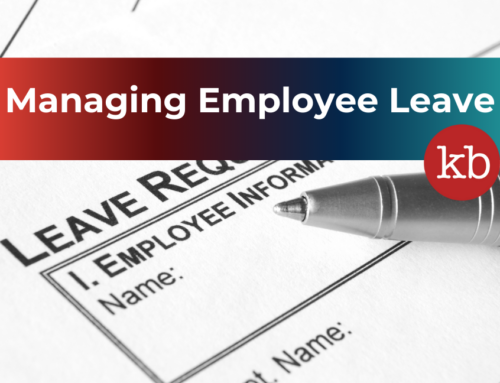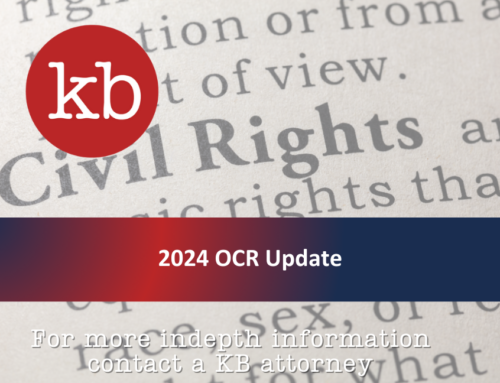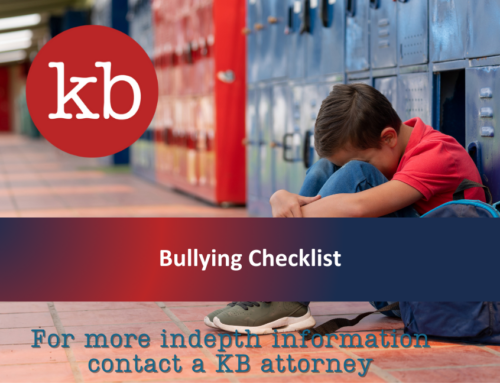Education Week ran an article on Feb. 3, 2023 highlighting a noticeable uptick in aggressive adult behaviors in PK-12 schools nationwide. The article, “Parents’ Bad Behavior at School Sports Events Has Gotten Extreme” by Elizabeth Heubeck, framed the issue of aggression through the lens of sporting events. Recently KB attorneys have observed aggressive adult behaviors not only during athletic events but also during school board meetings, school plays/musicals, class parties, field trips, bus stops, parent/ teacher conferences and the like.
Rules of Conduct and Sportsmanship
The article references an adult brawl at a middle school basketball game in Vermont that led to the death of a 60-year-old spectator. The National Federation of State High School Associations (NFSHSA) estimates that approximately 50,000 high school referees hung up their whistles between 2018-2021 due largely to poor behavior from adult spectators. The NFSHSA recently adopted a national campaign calling for adults to #BenchBadBehavior with a specially designed toolkit for schools to use: Homepage (benchbadbehavior.com). A child psychologist and senior lecturer at the Harvard Graduate School of Education who is quoted in the Education Week article believes the issue stems from parents/guardians who have generally become more hyper-focused on their own children and “tend to feel less collective responsibility,” noting that this has been an ongoing trend exacerbated by the COVID-19 pandemic.
The Illinois School Code allows public school districts to establish and enforce reasonable rules of conduct and sportsmanship for all spectators and visitors at athletic and extracurricular school events [105 ILCS 5/24-24]. Spectators at events in Illinois public schools may be banned from attendance for up to one calendar year after a hearing is held:
Any person who violates such rules may be denied admission to school events for not more than one year, provided that a written 10 days notice of the violation is given to such person and a hearing had thereon by the board pursuant to its rules and regulations. The administration of any school may sign complaints as agents of the school against persons committing any offense at school events.
The hearing required by the statute can either be held before the Board of Education or a hearing officer assigned by the Board unless specified otherwise through policy. Schools should make their rules of conduct for spectators public by posting them on the school district’s website and/or in the school handbook. Some schools even go so far as to make an announcement prior to the start of an event outlining their expectations for how the adults who are present will conduct themselves. In most situations, it is advisable to provide a warning prior to scheduling a hearing to deny admission to future events, although this can and should be addressed on a case-by-case basis depending on the egregiousness of the individual’s conduct. The Illinois Association of School Boards (IASB) addresses the topic in PRESS board policy 8:30 – Visitors to and Conduct on School Property (a copy of which is set forth below). Make sure to check your own board policy for more specific details.
Keep in mind that banning individuals from school board meetings involves a much more complex analysis. Athletic and other similar types of extracurricular school events are generally considered “limited public forums,” which means that a school can regulate access to the event if the restrictions are reasonable and viewpoint neutral. School board meetings, on the other hand, are generally considered “open forums” (sometimes also referred to as public forums) that involve public business and the expenditure of public funds conducted by elected officials. Restricting attendance at school board meetings must meet a much higher standard.
PRESS sample school board policy 8:30 – Visitors to and Conduct on School Property
Before any person may be denied admission to school events or meetings as provided in this policy, the person has a right to a hearing before the Board. The Superintendent may refuse the person admission pending such hearing. The Superintendent or designee must provide the person with a hearing notice, delivered or sent by certified mail with return receipt requested, at least ten days before the Board hearing date.
The hearing notice must contain:
- The date, time and place of the Board hearing;
- A description of the prohibited conduct;
- The proposed time period that admission to school events will be denied; and
- Instructions on how to waive a hearing.
Do not hesitate to reach out to a KB attorney to discuss these issues in more detail.
DISCLAIMER
This newsletter, provided by Kriha Boucek, is for general educational purposes only. For more comprehensive information, you should seek the aid of legal counsel.






